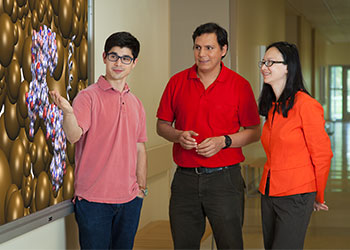Research Groups to Benefit, Training Workshops Available to All Students
A grant from the National Science Foundation will provide University of Houston research groups with faster computational power and offer invaluable training benefits for students.
 The $950,000 Major Research Instrument grant funds the purchase of a new high-performance
computer (HPC) which will be equipped with new technology, called accelerators, which
promises to be the prevailing trend of the future.
The $950,000 Major Research Instrument grant funds the purchase of a new high-performance
computer (HPC) which will be equipped with new technology, called accelerators, which
promises to be the prevailing trend of the future.
Computation an Integral Part of Research
A minimum of 23 research groups, from departments as diverse as physics, chemistry, biology and computer science, stand to benefit from the acquisition of this HPC, a fact that is a testament to just how integral computation is to today’s era of research.
“Computational science is useful because we can model, predict and analyze what data means. When you have a massive amount of data, the faster the computer, the better the programming skills, the more efficiently it will facilitate the application,” said Margaret Cheung, associate professor of physics in the College of Natural Sciences and Mathematics and the principal investigator for this grant. Co-principal investigators are professors Barbara Chapman (Computer Science), Eric Bittner (Chemistry), Lars Grabow (Chemical Engineering) and Pradeep Sharma (Mechanical Engineering).
New and existing research areas to benefit from this new HPC include analyzing and simulating space radiation; predicting the shape and behavior of proteins inside our cells; modeling new materials to meet alternative energy demands; developing more efficient programming methods of using accelerators; and modeling social and biological systems.
Accelerators – Trend of the Future
The accelerators in this new HPC – called graphics processing units – enable computers to run faster while being both compact and cost-effective.
“Accelerators are the trend of the future,” Cheung said. “If we really want to train the next generation of computational scientists, then we’d better train them to utilize this computer.”
These accelerators need specific modifications to computer programs in order to run properly. The knowledge of how to create these programs, and how to modify existing programs, is where the need for training comes in. Training opportunities on the HPC will be widely available, as part of the University’s on-going commitment to equipping students with the skills necessary to compete in today’s world.
Programming Workshops Available
“Any UH student with a Cougar ID is welcome to attend workshops at no extra cost,” Cheung said. One of the upcoming training opportunities, a workshop targeting seismic research codes called “Directives and Tools For Accelerators,” will be offered on October 12, followed by a one-day intensive coaching session for interested teams on October 13. In addition, the University also holds free workshops, offered by the Center for Advanced Computing and Data Systems, to enable students from all disciplines to learn programming skills. Students who are affiliated with a research group on campus will receive free access to the High Performance Computing Resources.
“I think every undergraduate student should learn a programming language, no matter their major, in order to be competitive after graduation,” she said. “I also encourage students, in order to have formal training, to participate in undergraduate research. The outcome of research is to learn by making mistakes, to learn by exploring, and to learn by discovery.”
In addition to the UH community, the computing resources will be shared with the University of Houston-Clear Lake, Texas Southern University, and Prairie-View A&M University, as an initiative to help broaden the participation of students from underrepresented groups in science, technology, engineering and mathematics (STEM).
- Rachel Fairbank, College of Natural Sciences and Mathematics